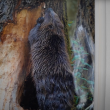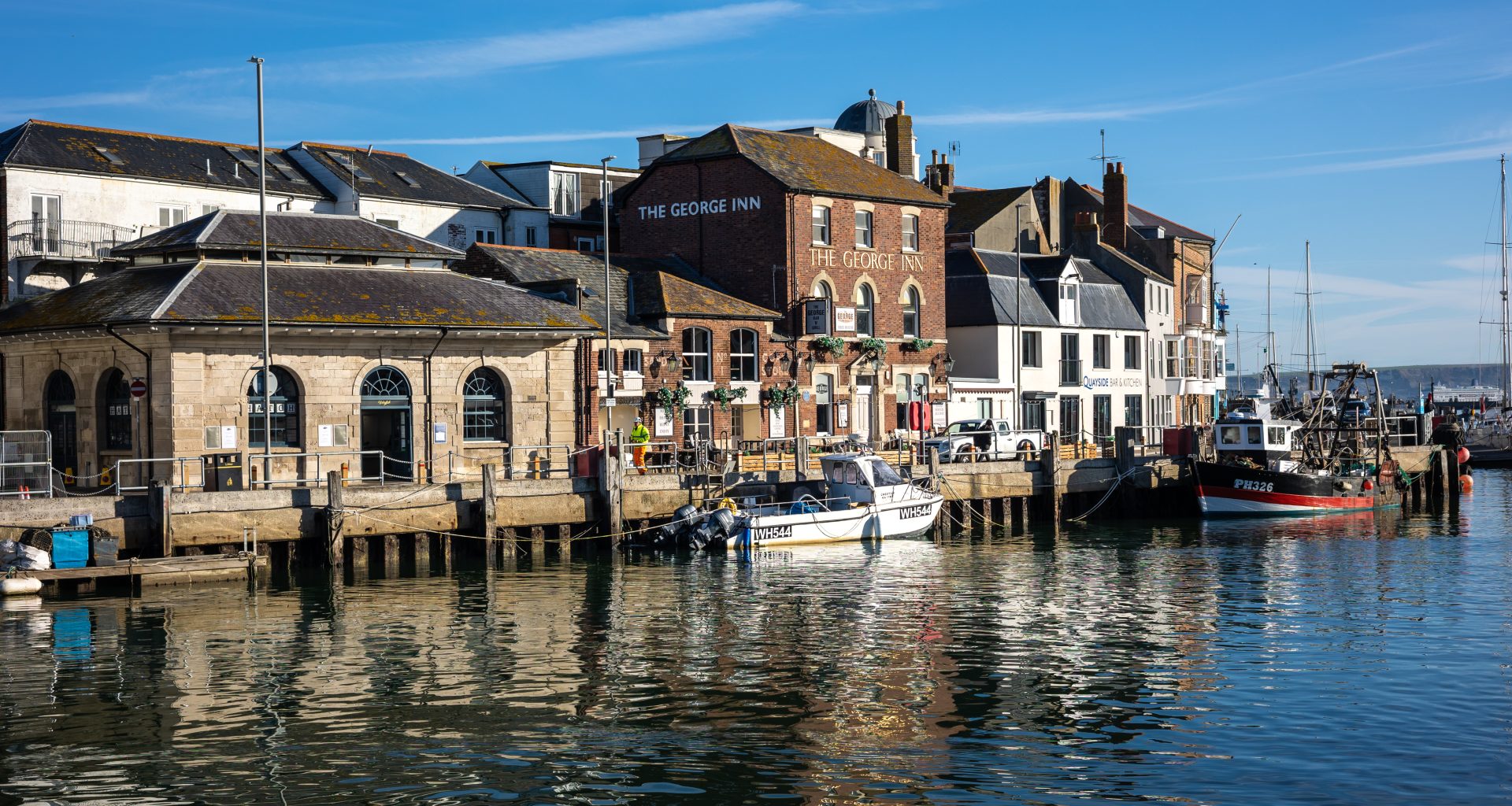At the heart of Weymouth’s harbour lies the Old Fish Market. Built in 1855, it quickly became a meaningful little building for both the town and the fishing community. Following a period of disrepute, where it took on many different forms – as a cold store, a fertiliser store, even a place where the local council could store equipment – it was then restored to its original purpose: a fishmongers, now named ‘Weyfish’.
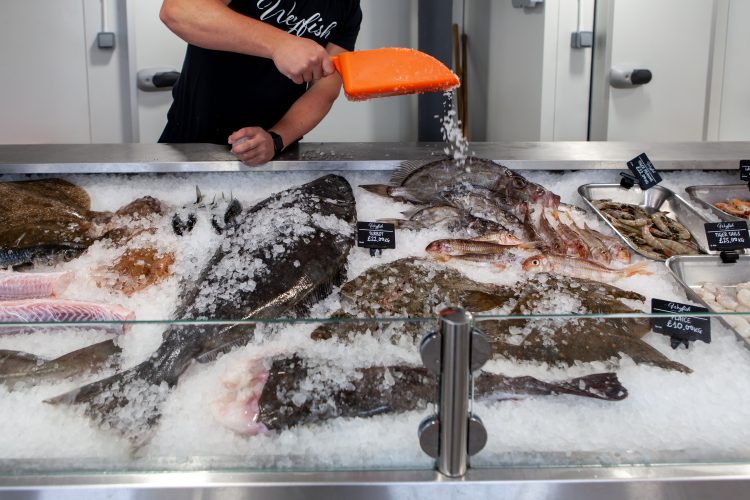
Sean Cooper, a former Gatwick Airport high-up, took over Weyfish in 2017: “I didn’t invest in Weyfish to make money. I invested in Weyfish because I cared about my local community and I cared about an iconic and historic building that was tumbling inwards on itself.”
The Old Fish Market’s initial decline was emblematic of the problems facing many coastal UK communities. Since the mid-1990s, the total number of fishers operating in the country’s waters has declined by almost 50%. Despite small-scale and traditional fishing methods being more sustainable and less impactful on our oceans, the industry has been struggling due to factors like the climate emergency, quota systems, and the rise of industrial overfishing.
Hand-in-hand with that rise has come the bad publicity. Documentaries such as Netflix’s Seaspiracy have pushed the plight of the oceans to the forefront of popular culture. The controversial practices of the large-scale global fishing industry, which also operates in UK waters, are becoming increasingly public.
“You know the thing that shocked me in Seaspiracy was seeing the size of these two paired supertrawlers, it was seeing the environment that they make enslaved people work in and the fact that some of these people die and nobody ever knows it. It was seeing the fact that dolphins were herded up and killed, those were the things that shocked me and I’m sure they shocked everybody else,” Cooper said, reflecting on the documentary.
Documentaries featured on popular streaming sites could be having an impact upon smaller fishing businesses, as opposed to the larger ones the footage is aimed at. The rise in people taking up a vegan lifestyle coincides with a greater public consciousness around the climate crisis and animal welfare. According to the Goodness Project, the number of vegans quadrupled between 2014 and 2019. ‘Veganuary’, a campaign where people adopt a vegan lifestyle for the month of January, saw 500,000 people take part in 2022, double the amount of people in 2019.
Veganism is being positioned as the solution to exploitation of the natural world, including overfishing.
But those involved in local fishing business think otherwise. Cooper says: “The general gist of shining a light on the poor practices of the global fishing industry, bang on. But the central message of “don’t eat fish!” fundamentally misses the mark because the point is – and I say this to everybody that wants to ask me about this – if you want to buy fish, if you want to eat fish, you want to know where that fish has come from.”
Weyfish’s produce is caught sustainably: by rod-and-line, static nets, and modern methods of crabbing. Attention is paid to ensure there is no bycatch, nor small or juvenile fish caught before they are mature.
“You compare that to going into a supermarket or eating in a fine dining restaurant in London, and I guarantee you one thing, every single bit of fish that is sold has been caught on a beam trawler and a beam trawler spends 7 days at sea. It destroys the seabed. And then when it comes in, the fish is up to 7 days old. When you’re buying that fish it could be 10 days old as a minimum, whereas my fish are 10 hours old and I can tell you that the proceeds of that fish sale haven’t gone into a big corporation that might be based in Spain or France or wherever it’s gone into. It’s gone into Mr X who lives in the town [Weymouth] and who’s bringing up his family and keeping a roof over his head. And every penny of it is kept in the community.”
Weymouth – and its occupants’ – have long relied on their strong tradition of fishing.
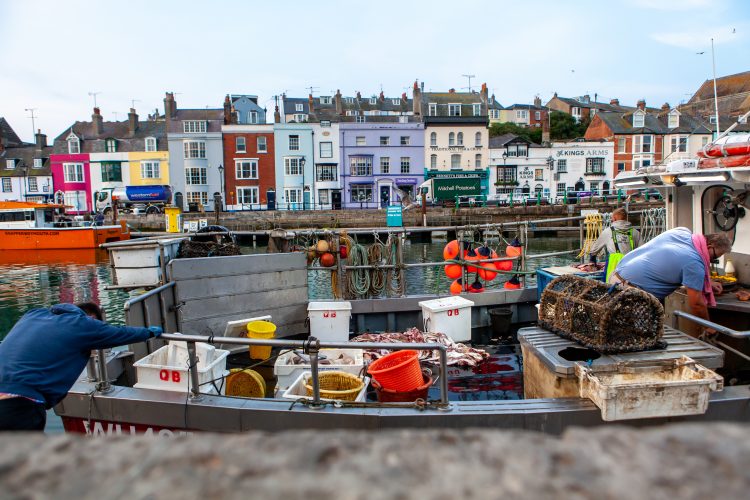
Cooper calls Weyfish a ‘community based business’. The relationship between his fishmongers’ and the local Weymouth fishing fleet – and the people who work on it – is crucial. Weyfish recognises the importance of fishing to the town and to the country: “Weymouth as a harbour, accounts for about 40% of all line-caught sea bass in the UK. Not many people know that.”
Many people in the town still rely on fishing to make a living, and it’s why external pressures such as changing public perception towards fishing (such as more people adopting ‘veganism’ as a solution to overfishing) is so threatening. That’s why – when Weymouth’s harbourmaster started disadvantaging the fishing fleet in favour of the leisure craft, endangering their livelihood – Cooper and Weyfish fought back strongly:
“The reason people come to Weymouth is to see a working harbour. The reason the leisure craft come to Weymouth is because they want to sit cheek by jowl with fishing boats.
“If it was just a sanitised area and it was just leisure boat, leisure boat, leisure boat; the same people wouldn’t come. The same people that come and stand in groups of 50 watching as a fisherman lands their catch on the harbour wall and drags it across the road into the back of the fishmongers. That is the raison d’etre of Weymouth.”
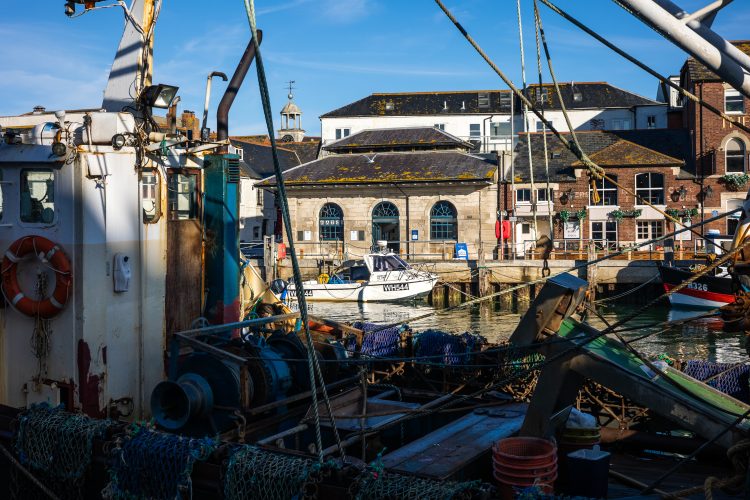
Perhaps the lines between sustainable fishing like in Weymouth and industrial overfishing around the world such as trawling have become blurred. These practices differ both in profit and methods. Popular documentaries are placing industrial fishing and small businesses under the same umbrella. These are two separate narratives, and seaside towns who rely on responsible fishing are seeing their way of life at risk.
Weyfish wants to change the conversation, and ensure the safe future for small scale community fishing: “What’s incumbent upon us? Is it to find other ways to tell a different story? The biggest thing for me about Weyfish, about my catch, and my boats, is to be able to tell the story that there is another way. There is another way to feel good about eating fish because you know it’s been caught in the most sustainable way and it’s sustaining an entire coastal population both from a tourism perspective and from a commerce perspective, and we have to find a way to tell that story.”


